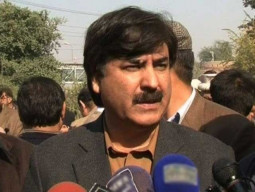
Waste from the Hattar Industrial Estate (HIE) is taxing the nearby ecosystem and putting people at risk of various diseases. Moreover, because Pakistan is a member of the World Trade Organisation, products from these industries can be banned by international bodies.
Spread over an area of 1,063 acres, the HIE houses 215 operational, 378 closed, 162 under construction and 98 sick industrial units; it houses chemical, vegetable oil manufacturing, steel, paper, cement, marble, pharmaceutical, textile, poultry feed and beverages industries, which according to a report of the Environmental Protection Agency (EPA), are the key source of pollution in the area.
(Read: Industries urged to comply with standards)
Apart from hazardous emissions by marble, fibreglass, cement, poultry feed and steel manufacturing units, most of the units do not have waste treatment facilities. The firms discharge their untreated effluent in Jhar, Noro and Dojal drains. It has been estimated that 20,000 gallons of wastewater is discharged into these drains every day.
The industrial waste then passes through more than 100 villages of Haripur and Attock; a part of the waste is absorbed by the cultivated land, while the rest ends up in ditches and ponds.
Due to the absorption of water by the land, the villagers are at a greater risk of harmful diseases such as brain tumour, bronchitis, kidney, lung and skin diseases and bone deformation, according to doctors.
Residents also complain of bad smell coming from the water, due to decomposition of solid waste and volatile organic compounds.
According to a study carried out by Rural Development Project, a local non-governmental organisation (NGO), unchecked industrial waste has reduced the agricultural produce by 30 to 40 per cent, while over 20 per cent of people living near HIE are suffering from skin allergies and kidney, respiratory and eye diseases.
There have been efforts to curb pollution in the past. During the tenure of Shaukat Aziz, the former prime minister, Haripur embarked on a plan to mitigate pollution through establishment of the Combined Effluent Treatment Plant (CETP).
The Ministry of Environment principally agreed to establish the CETP on February 3, 2007 at a cost of Rs225 million in Phase IV of the HIE. The purpose of the plant was to bring pollutants under permissible limits.
The project was proposed to be set on two hectares, and would have been completed in three years. The annual operating and maintenance cost for the project was estimated at Rs 39.72 million, which was to be born by the Ministry of Environment for three years, before handing it over to HIE CETP Company.
The stake of shareholders was fixed at 50 per cent for the government, 25 per cent for Export Development Fund, 15 per cent for provincial government, five per cent each for the district government and the private sector.
The project would have reduced pollution, improved conservation of natural resources and ecological assets, rehabilitate destroyed land and reduce the health budget by 30 per cent.
However, the plan was shelved as soon as the previous government ended its term.
HIE Industrialists’ Association Vice President Malik Ashiq Awan said that the industrialists are ready to contribute their share for the construction of CETP. However, he said that the entrepreneurs are paying billions of rupees to the government and it should do its bit to protect the environment.
Sarhad Development Authority (SDA) Manager Yousuf Khan said their plan for the HIE includes a treatment plant for industrial waste, maintenance of infrastructure, installation of street lights, drains and water supply. Khan said that the SDA is motivating industrialists to “respect” EPA laws.
He said that the cement manufacturers were using electric precipitators in their units, due to which dust emission has been controlled to a great extent.
However, the officials of an NGO Sharaf Foundation believe that one of the cement plants was using an outdated dust control system which gets tripped after some time, causing the dust to be emitted unchecked.
Published in The Express Tribune, August 26th, 2011.

1732745394-0/Diddy-(4)1732745394-0-165x106.webp)















COMMENTS
Comments are moderated and generally will be posted if they are on-topic and not abusive.
For more information, please see our Comments FAQ